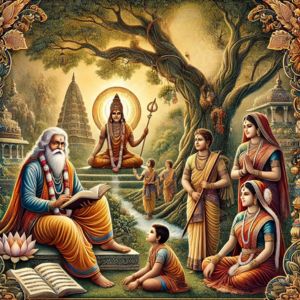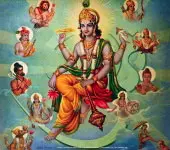Who is Guru Ji?
Indian culture deeply respects gurus , valuing their pivotal roles in spiritual and moral guidance.

In the rich tapestry of Indian culture, the roles of gurus (teachers) are held in high esteem, embodying values that are central to the spiritual and moral framework of society. This deep respect for gurus is woven through the sacred texts and everyday practices, offering a profound perspective on their importance.
Who is a Guru?
A guru in Indian culture is much more than just a teacher who imparts academic knowledge. They are revered as spiritual guides who lead their students (shishyas) on the path of righteousness, helping them understand deeper spiritual truths and guiding them through personal growth. The scriptures say that a guru teaches sacred texts, like the Vedas, and performs essential rituals, making them pivotal in the spiritual lives of their students.
The respect for a guru is so profound that they are often equated with Gods in their ability to inspire and enlighten. For example, gurus are praised not only by humans but also by gods and celestial musicians known as Gandharvas, highlighting their esteemed position in the cosmos.
Parents as the First Gurus
In Indian culture, parents are considered the first and foremost teachers of a child. They are seen as the personifications of godly attributes on Earth - there is no deity equivalent to one’s father and no teacher like one’s mother. The texts advocate for showing unconditional respect and service to one’s parents, emphasizing that there is no way to fully repay them for their upbringing and care. The relationship with parents is described as devoid of deceit, built on a foundation of respect, love, and reverence.
Virtues and Responsibilities of a Good Guru
The texts elaborate on the virtues that make a good guru.. These include righteousness, knowledge of the scriptures, purity, restraint, and an unwavering commitment to the well-being of their disciples. They are expected to be models of good conduct, instilling values and ethics in their students and children.
A significant aspect highlighted is the spiritual and ethical responsibility of a guru. If a student misbehaves or follows an immoral path, it is believed that this negatively impacts the guru as well, emphasizing the interconnectedness of their relationships.
Social and Moral Expectations
The societal framework as detailed in the texts expects individuals to show utmost respect to gurus. Disrespect is seen as a grave moral failure with severe spiritual consequences.
Cultural Reflections in Everyday Life
These values are not just theoretical but are reflected in the everyday practices and interactions in Indian society. From the Namaste greeting, which symbolizes respect, to the various rituals that honor teachers during festivals and personal milestones, these principles are lived out daily.
Why These Values Matter
Understanding and integrating these values can provide a sense of identity and continuity with cultural traditions. It fosters a sense of responsibility and respect for the wisdom of the past while navigating the challenges of modern life. Embracing these roles and virtues can help in developing a well-rounded character, rooted in respect for knowledge and moral integrity.
In conclusion, the revered status of gurus and parents in Indian culture serves as a reminder of the pivotal role that education, both academic and spiritual, plays in personal development. It underscores the belief that true knowledge transcends mere facts, encompassing wisdom, ethical living, and spiritual growth. As such, gurus are not merely instructors but are pillars of society that uphold and pass on the rich heritage of Indian culture to the next generation.
Comments
Read more comments
Is Dwaraka submerged in water?
Yes. The Yadavas fought among themselves and killed each other. Krishna left for his divine abode. Arjuna took the remaining inhabitants out of Dwaraka. Then the sea swallowed Dwaraka.
Andamans got its name from Indradyumna
Andamans is called Indraman in Puranic literature. King Indradyumna used to rule over the Andamans.
Quiz
Who conveyed the comments of citizens about Seetha Devi to Lord Rama after they returned to Ayodhya ?Recommended for you
Mantra for Devi's Blessings

om namaste shaktiroopaayai maayaamohasvaroopini . jagaddhaatryai namastubhyam jaganmaatarnamo namah' ......
Click here to know more..Action-inaction-action-inaction

Chamundeshwari Mangala Stotram

bhadrakaali sadaa tubhyam chaamund'aayai sumangalam. agastyaaya hayagreevaprakat'eekri'tavaibhave. anantaakhyasute tubhyam chaamund'aayai sumangalam.....
Click here to know more..
English Topics
Rare Topics
Click on any topic to open
- 240 Who is Guru Ji?
- 239 Madurai Veeran
- 238 Distinguishing a Realized Soul from an Ordinary Man
- 237 The Practice of Bhojana Sadhana
- 236 Words of Wisdom - 2
- 235 Defining Goodness - Sanatana Dharma's Perspective
- 234 Vibhishana in Ramayana - A Tale of Morality, Loyalty, and Redemption
- 233 God will not let you break
- 232 A Glimpse into the 64 Arts
- 231 Chembai Vaidyanatha Bhagavatar - A Carnatic Maestro's Musical Odyssey
- 230 Understanding Adhyāsa: A Closer Look at False Attribution
- 229 Is Family's Permission Necessary For Becoming Sanyasi ?
- 228 Faith In Upasana
- 227 Divine and Demonic Qualities
- 226 Words Of Wisdom - 1
- 225 Caste System In India - A Unique Perspective
- 224 Ishta Devata: Understanding Your Personal Deity
- 223 The Meaning Of Dharma: A Comprehensive Explanation
- 222 Understanding Sanatana Dharma: The Eternal Truth
- 221 Who Is The Supreme God In Hinduism?
- 220 The Benefits of Akhanda Nama Japa for Mind, Body, and Soul
- 219 Brahma - The Creator God
- 218 10 Quotes on Haridwar That Capture Its Spiritual Essence
- 217 Hinduism - A Religion Or A Way Of Life?
- 216 Why Did Shiva Kill Kamadeva?
- 215 Understanding Karma: What It Means and How It Works
- 214 Putting Time And Effort Into Your Relationship With God
- 213 The 6 Holy Teerthas Near You
- 212 Varuna The Water God
- 211 What Are The Benefits Of Chanting Kalabhairava Ashtakam?
- 210 Chronology Of The Universe
- 209 How the World Works: An Insightful Story
- 208 Why You Should Never Forget Your Promise to God
- 207 What is the importance of planting trees?
- 206 What happens to sinners in Yamaloka?
- 205 Nama Japa - Its Power And Benefits
- 204 Lakshmi And Vishnu - Interesting Facts
- 203 How Did Krishna Die?
- 202 Who Would Have Recorded Vishnu Sahasranama?
- 201 An Easy Way To Learn To See God
- 200 Arundhati
- 199 Anasuya
- 198 Dadhichi
- 197 Alakshmi, The Goddess Of Poverty
- 196 Adultery In Hinduism
- 195 Brahmahatya
- 194 Nath Sampradaya
- 193 Adhiratha
- 192 Ajagava, The Bow Of Lord Shiva
- 191 Who was Karna in his previous birth?
- 190 What are Asuras?
- 189 What happened to Amba, Ambika, and Ambalika?
- 188 How is Jarasandha related to Kamsa?
- 187 Who was Kamsa in his previous birth?
- 186 Akrura
- 185 Panchajanya
- 184 Secrets of Adishesha's Greatness
- 183 Agni Purana
- 182 Who Are Aghoris?
- 181 Allasani Peddana
- 178 The Seasons Are Behind Life On Earth - Says Veda
- 177 Who Advocated The Advaita Philosophy?
- 176 Adityas
- 175 Aditya Purana
- 174 The Yuga-cycle
- 173 These 12 Can Get You Into Trouble
- 172 Nagas, The Serpents
- 171 Alwars
- 170 Adhyatma Ramayana
- 169 Adhidaivika Suffering
- 168 Adavus in Bharatanatyam
- 167 Achyutananda Dasa
- 166 Did Sage Parashara Lose His Self Control When He Saw Satyavati?
- 165 Why Soma Juice Is Used In Yaga
- 164 Abraham Pandithar
- 163 Abhyanga
- 162 Abhivadaye Mantra
- 161 Abhisheka
- 160 Abhinaya Darpana
- 159 Abhinaya Chandrika
- 158 Abhinaya
- 157 Abhinavagupta
- 156 Why Abhimanyu Died In Mahabharata
- 155 Indradyumna Sarovar
- 154 Bhima Meaning
- 153 Other Names Of Bhima
- 152 Son Of Bhima And Hidimba
- 151 Wives of Bhima
- 150 Abhimanyu Vadh
- 149 The mysterious birth of Jarasandha
- 148 How big was the kingdom of Jarasandha?
- 147 Who was the wife of Jarasandha?
- 146 Bharani Nakshatra Female - Characteristics
- 146 Ashwini Nakshatra Famous Personalities
- 145 Who created God Prajapati?
- 144 Abhang
- 143 Abhayamudra
- 142 Abhedananda Swami
- 141 Abhichara
- 140 Abhijnanashakuntalam
- 139 Abhimanyu Samanta Singhar
- 138 Ashwini Nakshatra Female
- 137 Relationship between Nakula And Draupadi
- 136 Madri - Mother Of Nakula And Sahadeva
- 135 Indradyumna Maharaj
- 134 Satyavati Birth Story
- 133 Satyavati And Parashar
- 132 Satyavati - The Powerful Queen in Mahabharata
- 131 Dhanishta Nakshatra Female - Characteristics
- 130 Qualities Of Abhimanyu
- 129 Marriage of Abhimanyu and Uttara
- 128 Why Abhimanyu died at 16?
- 127 Meaning Of Abhimanyu
- 126 Why Prahlada Could Not Be Killed
- 125 Abhimanyu, the Hero of Mahabharata | A True Story of Courage
- 124 Story of Nakula
- 123 Discover the Legendary Satyavati from Mahabharata
- 122 Story of Upamanyu
- 121 Agnivesha
- 120 Uttara Kumara
- 119 Story Of King Indradyumna
- 118 Akupara The Immortal Tortoise
- 117 Muthuswami Dikshitar
- 116 Perumal
- 115 Rudraksha Types And Benefits
- 114 Aghasura And Lord Krishna
- 113 Bilva And Its Greatness
- 112 Puranas are organs of Sri Hari's body
- 111 For A Safe Pregnancy And Healthy Baby
- 110 Lakshagriha
- 109 How did Bhima get the power of 10,000 elephants?
- 108 Rishika - The Female Rishi
- 107 The Expelled Aryans To The West Of Sindhu
- 106 The mysterious birth and childhood of Bhima
- 105 Which Yoga Is Suitable For Me?
- 104 Karma-yoga and Jnana-yoga lead to bhakti
- 103 Action And The Concept Of Brahman
- 102 Did Shiva drink the entire poison?
- 101 What are the characteristics of Kaliyuga?
- 100 How to deal with contradictions within Hinduism?
- 99 Who is Balarama’s wife?
- 98 Is Brahmastra a nuclear weapon?
- 97 What is the real name of Veda Vyasa?
- 96 Why is Prayagraj famous, and great?
- 95 Story of Jarasandha
- 95 Rishis See Mantras
- 94 Why Both Monsoon And Year Are Called Varsha In Sanskrit
- 93 The Rebirth Of The Saptarshis
- 92 Mystery Behind The Births of Parashurama and Vishwamitra
- 91 Parishechana Mantra - Meaning
- 90 How to learn the Vedas
- 89 Geography of Tripuras which Mahadeva destroyed
- 88 Everything comprises of two contradictory elements
- 87 What happens to you when you lie
- 86 What to do with photos and idols if they are damaged
- 85 Dharma is uniting- adharma is dividing
- 84 The real reason behind observing brahmacharya.
- 83 Imposing limitations precedes creation
- 82 Is God necessary?
- 81 Mind also generates dirt
- 80 Power of taking the divine name
- 79 Rulers decide how a nation should think
- 78 Do you know what Parasurama did immediately after he got divine weapons from Lord Shiva?
- 76 Vedic concept of perception is completely different
- 75 The structure of our Vedas
- 74 What exactly is Satsang?
- 73 Why Anantha is carrying the earth on his hood
- 72 Corrupt mind suspects- Suspicion corrupts the mind
- 71 How to incorporate the ideals of Sanatana dharma into your daily life
- 70 Do you know what happens when an atma and body come together?
- 69 Yajno hi shreshtatamam karma
- 68 The greatness of Ganga
- 67 What is the difference between Asuras-Daityas-Danavas and Rakshasas?
- 66 Lord Krishna Calls Himself A Brahmachari, Can You Believe That?
- 65 Looking at a painting through a microscope
- 64 Dharma is not common for everyone
- 63 Ayurveda explores into the mysteries of life
- 62 How can you say for sure that this is not there in our scriptures?
- 61 The sixty four organs of Bhakti marga
- 60 Story Of Ekadashi
- 59 Story of Priyavrata
- 58 Someone wanted to know the definition of God
- 57 Birth as a human being is so precious
- 56 Why does one God go to another for help?
- 55 Do you know about the greatness of Mahee Sagar in Gujarat?
- 54 Do you know how we were till a few centuries back?
- 53 Giving 1 percent of yours to God and expecting him to take care of you 100 percent- Is this fair?
- 52 Aham Brahmasmi - is it not arrogance to call yourself God?
- 51 Nayanmars- the perfect Shiva Bhaktas of Tamil Nadu
- 50 The greatness of Ayodhya being explained in the presence of Lord Rama himself
- 49 Are our Puranas myth or narration of real incidents?
- 48 Can women learn the Vedas?
- 47 Do you know why we have two kinds of Yajurveda? Krishna Yajurveda and Shukla Yajurveda
- 46 Do not mix faith and knowledge
- 45 Have you wondered why there is more celebraton during Ganesh Visarjan than the arrival of the Lord?
- 44 It makes more sense to pray for others than for yourself
- 43 Is God a positive energy?
- 42 Is it really possible to infuse prana into a stone idol?
- 41 Vairagya means a shift of focus
- 40 Scriptures say that divinity is present in the human body itself- How has this happened?
- 39 Who is greater- Shiva or Vishnu?
- 38 Is there a correct spiritual path?
- 37 Chastity is a great power- Sukanya is an example for this
- 36 Do you know what is the goal of life?
- 35 Are man and God the same?
- 34 How to gain spiritual power?
- 33 Chastity and motherhood are very important in Sanatana Dharma
- 32 Why Bhartruhari became a vairagi
- 31 Sanatana Dharma believes that reforms are for everyone
- 30 Three kinds of duty
- 29 Manki Geeta
- 28 What is the meaning of Vayu?
- 27 Your karma becomes part of you
- 26 Do you know when to use the prefix Shri?
- 25 Do you know how to cultivate virtues?
- 24 God as a variable
- 23 A trader outshines a tapaswi in religious merit
- 22 Loyalty is a great virtue to this story
- 21 Name of the mother used to be more important
- 20 The reason why you are getting married will have bearing upon the child to be born to you
- 19 Universe is called Jagat in Sanskrit- Do you know the meaning of this term?
- 18 Why do we consider Guru as God?
- 17 There is so much about greed
- 16 Which one gives its result first- good karma or bad karma?
- 15 Eight kinds of wealth and how long each one lasts
- 14 Eclipse is not all that dangerous
- 13 Do you know what really Brahmastra is?
- 12 God always answers prayers
- 11 Importance of Anna daanam
- 10 What does Ayurveda has to say about alcoholism
- 9 A boy who went to Yamaloka and came back
- 8 Do you know the importance of undertaking a pilgrimage?
- 7 Nothing is as caring about nature as Sanatana Dharma
- 6 Gautami's Mysterious Story from Mahabharata
- 5 Do you know this about crows?
- 4 Why You Should Never Forget Your Promise to God
- 3 Rules To Follow In Temples
- 2 Your House Is A Living Entity
- 1 How Chanting Stotras While Cooking Can Improve Your Family's Well-Being
31
Ganapathy
Shiva
Hanuman
Devi
Vishnu Sahasranama
Mahabharatam
Practical Wisdom
Yoga Vasishta
Vedas
Rituals
Rare Topics
Devi Mahatmyam
Glory of Venkatesha
Shani Mahatmya
Story of Sri Yantra
Rudram Explained
Atharva Sheersha
Sri Suktam
Kathopanishad
Ramayana
Mystique
Mantra Shastra
Bharat Matha
Bhagavatam
Astrology
Temples
Spiritual books
Purana Stories
Festivals
Sages and Saints
Bhagavad Gita
